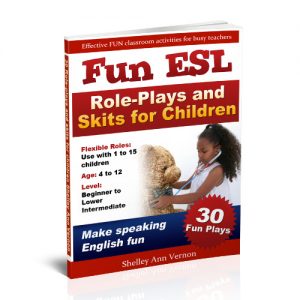Learning English through drama brings incredible benefits to an ESL classroom. Have you ever wanted to use drama to teach English, but you don’t feel sure of yourself? Discover all about it in this blog!
Discover a world of motivation and fun
Dragica Zdraveska is a talented and inspirational English language teacher who has fun with drama at a primary school in Macedonia. She tells her story below, from wanting to use role-plays with her children but not getting around to it to finally taking the plunge and discovering a world of fun and motivation for her young ESL pupils.
Here are her comments from her experience with my short ESL role plays. You’ll see from the final video that children really do love learning English like this. Learning English through drama is more fun, more interesting, more motivating, and MORE EFFECTIVE!
So what are you waiting for? Read Dragica’s article and take the plunge to make short, fun ESL role-plays a part of your English lessons.
Potential problems
“I was by no means unfamiliar with the benefits of learning English through drama in the ELT classroom. As an ardent conference and seminar attendee, I got acquainted with the basics and was very keen on using ESL role-plays and skits when I first began teaching English. But my major problem was that I couldn’t find proper material in terms of content and level of English. Apart from that, I thought it would be time-consuming and that my very young students wouldn’t stay focused and concentrate long enough for me to pull it off.
Sourcing suitable role-plays
However, once I came across Shelley Ann Vernon’s book “ESL role-plays and Skits for Children,” I could no longer make excuses since the role plays were all I have ever wanted. Simple, straightforward, catchy, and engaging they were perfect for exploration and use. So, I presented them to my English students, certain they would share my opinion and enthusiasm.
I carefully read them beforehand and chose the most appropriate and relevant ones in my context in terms of vocabulary and structures. For example, when we learned about places in town, we decided to stage the ESL skit “Let’s go for a walk,” which gave a wonderful touch and wrapped up that particular theme. I wanted to start with vocabulary themes the children were familiar with to make it easier for them and more meaningful. Moreover, I was realistic in my expectations English language and acting-wise.
I was aiming to use the plays in class with virtually no props and as part of regular lessons. However, we decided to stage at least one short ESL role play “properly” and perform it in front of parents, which helps parents feel included and involved in their child’s progress. We are working on making them perfect!
Preparing students for the role-play
Before the short skit, we had activities and games to practise the vocabulary and structures. We also made a booklet, drawing sketches of the scenes from the role play, featuring the characters in the skit and their speech in bubbles. Then, we did matching and guessing activities, associations, pantomime, etc. But, what I took to be the biggest success was the children’s willingness to participate no matter how uncertain they felt about the language. So, every child was able to take the first and most difficult step!
Shy students
Some children were very timid and didn’t feel at ease when I filmed them, which made them react differently and not perform as well as when they weren’t recorded. I consider that to be a major drawback.* Furthermore, I felt that correcting them while they spoke would backfire and they would step back. So, I tried not to interrupt and instead discussed the error or hesitation with them afterwards. The video I made also revealed that their pronunciation was occasionally unclear, and some phrases sounded ambiguous at times. That gave me food for thought and encouraged me to prepare my students better and practice the short ESL skits far more to gain better results.
Learning English with drama works!
I am sure that using ESL role-plays and drama helps children learn English, improve their acting and social skills and learn structures, vocabulary, everyday phrases in an authentic manner and while having fun! Therefore, I recommend these short ESL role plays and skits for children to any teacher wanting to make learning English more enjoyable while giving English learners a boost in confidence.”
Dragica Zdraveska, English language teacher at Cyriland Methodius Primary School, Prilep, Macedonia
Performance tip from Shelley
Rehearse the skit over several lessons, not necessarily for the entire time. Run through it at the end of a class to refresh, revise and refine. Wait until the skit is fully learned before filming. When children are confident enough to perform it, that’s when they will enjoy showing off in front of the camera.
Watch an example:
PS Teachers and parents, you will find extracts from Dragica’s video on YouTube here:
https://www.youtube.com/watch?v=lj2gN56ENnE&feature=youtu.be
Get 30 skits like this!
-
Sale Product on sale
 Fun ESL Role-plays and Skits for Children
Fun ESL Role-plays and Skits for Children€19.97Original price was: €19.97.€15.33Current price is: €15.33.
Helpful posts on learning English through drama
For more help on learning English through drama, please check out these posts:
ESL role plays for children


2 thoughts on “Learning English through drama”
I am an english language teacher living in France. I have already bought FUN ESL and I use it every year. My kids and their parents love them.
Dear Brigitte, Thank you so much for your kind comment on this blog. I am so glad that you are getting good use out of the skits – well done to you for getting stuck in! All the best Shelley